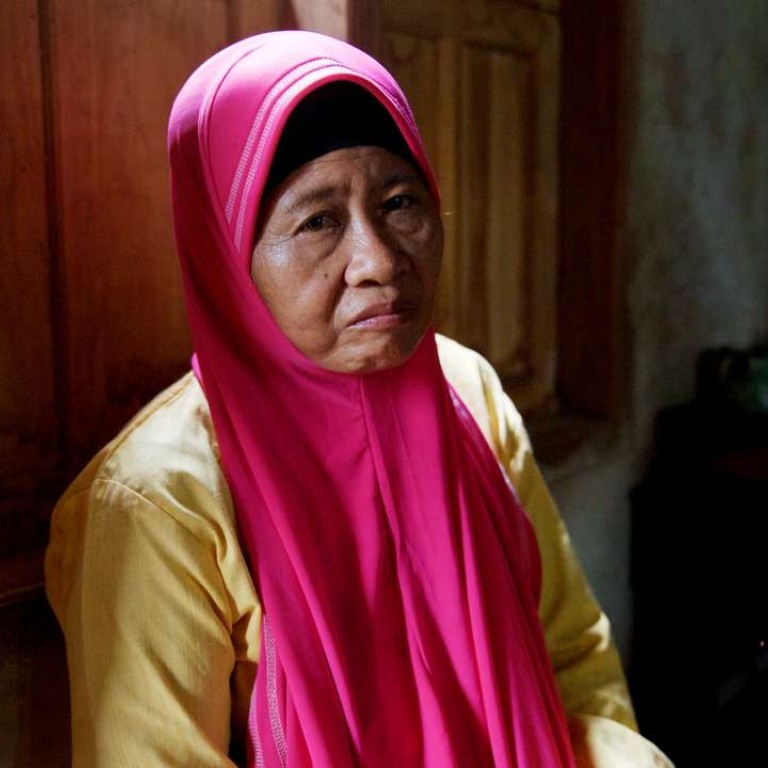
Exclusive | Waitress killed by British banker Rurik Jutting in Hong Kong never saw house bought with her hard work
Juminem, 56, wishes daughter never left Indonesia
Just hours before she received news of her daughter’s death, Juminem caught sight of a bad omen outside her home.
“That morning I saw black crows appearing in the sky, circling my house,” she recalled.
The 56-year-old lives in Pulau Muna, a remote island village in Sulawesi, Indonesia, hours from the nearest domestic airport and further still from Hong Kong, where her daughter Seneng Mujiasih was brutally murdered.
A neighbour, whose daughter was Seneng’s friend in Hong Kong, knocked on their door and broke the news: “Seneng is gone”.
Juminem refused to believe it at first, because she had spoken to her daughter on the phone only a day or two ago.
They immediately rang another friend of Seneng’s in Hong Kong, who also said it was true. A call to a third friend confirmed the grim news.
Two years on, “Seneng is gone” was still a line the distraught mother recited repeatedly during her interview with the Post.
“After hearing the news I was so hurt I fainted,” Juminem said.
During the double murder trial that shocked Hong Kong and the rest of the world, the court heard that Seneng, 26, met British banker Rurik Jutting at the New Makati Pub and Disco in Wan Chai. She was working there as a waitress.

Jutting allegedly offered her money and invited her back to his place on November 1, 2014, where he slit her throat in a struggle.
Seneng’s body was flown home on November 14, but her mother was too devastated to be present – she collapsed upon hearing the sound of the vehicle carrying Seneng’s body even before it arrived.
Seneng’s grandmother Karso Utomo, 85, still dreams of her and even claims to have seen the spirit of her granddaughter around the house.
Family members said Seneng was a polite and cheerful girl, as reflected in her name, which means “happy” in Bahasa Indonesia.
“She wasn’t a person with big dreams,” her mother recalled, adding that Seneng was a simple girl whose only wish after graduating was to “go out and work to help the family”.
have a strong sense of regret. If she had not left for Hong Kong, she might still be alive. Even without food, at least we would be together
In 2007, Seneng went to Hong Kong to work as a domestic helper, sending about five million rupiah (HK$ 3,000) home every two months.
The family used the money to build their new house, with higher ceilings and brightly painted walls. Their previous home was a wooden hut even smaller than one of Hong Kong’s notorious shoebox flats.
Most of the construction was finished in 2013, with a room set aside for Seneng.
But she never saw the house bought with her hard work – the last time Juminem’s daughter returned was in 2009.
No one stays in Seneng’s room, which the family mostly uses to store the rice they grow. The dining room is spacious but contains nothing more than a few chairs. Sunbeams creep through the window, stretching across the floor with little furniture to block their advance.
The painting work on the rear of the house remains unfinished because the family ran out of money.

Seneng’s family was part of a government transmigration programme when they moved from Java to Sulawesi three decades ago.
They speak mostly Javanese but not the local language and Bahasa Indonesia, the national language, which made them more withdrawn than other families.
They need a neighbour to translate for them, especially when sorting out matters related to Seneng’s death, such as a potential legal suit against Jutting.
With Seneng gone, the family’s financial burden is greater. It did not help that Juminem’s diabetes deteriorated rapidly after her daughter’s death, impairing her eyesight.
It was due to sadness, she said.

Juminem and her husband are both too weak to farm, but the family has to fork out at least 500,000 rupiah a month for her medical expenses.
The family makes ends meet by selling the chocolate they grow, as well as rice Seneng’s brother Srisuwantoro, 32, farms and harvests.
But when there are no customers, they earn less than 100,000 rupiah a month, forcing them to borrow from their neighbours.
Juminem is hoping the family can get substantial compensation from Jutting, given her poor health and medical expenses.
Yet nothing can change one fact, she said.
“Seneng is gone.”
Juminem said: “I have a strong sense of regret. If she had not left for Hong Kong, she might still be alive. Even without food, at least we would be together.”
Chris Lau is reporting from Indonesia
To donate
The Asian Migrants’ Coordinating Body is raising funds for the two victims’ families over two weeks. You can donate at:
Account name: Association of Indonesian Migrant Workers in Hong Kong
Account address: Nathan Road, Jordan, Kowloon, Hong Kong SAR
Account number: 127-7-027379
Bank name: HSBC
Please SMS or Whatsapp your receipt to 6992 0878.

